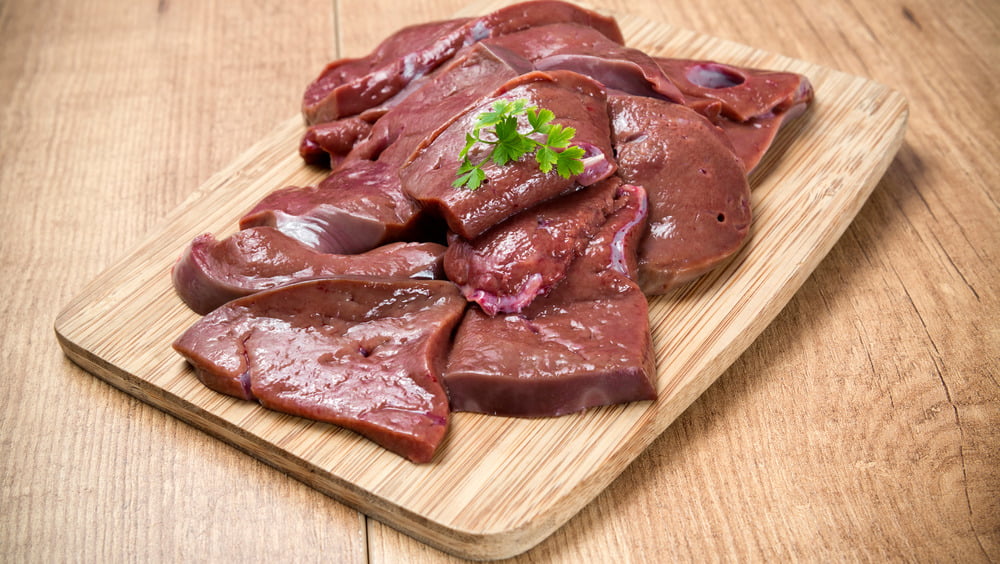Homemade Food for 2-Month-old Kittens: Safe and Easy Options
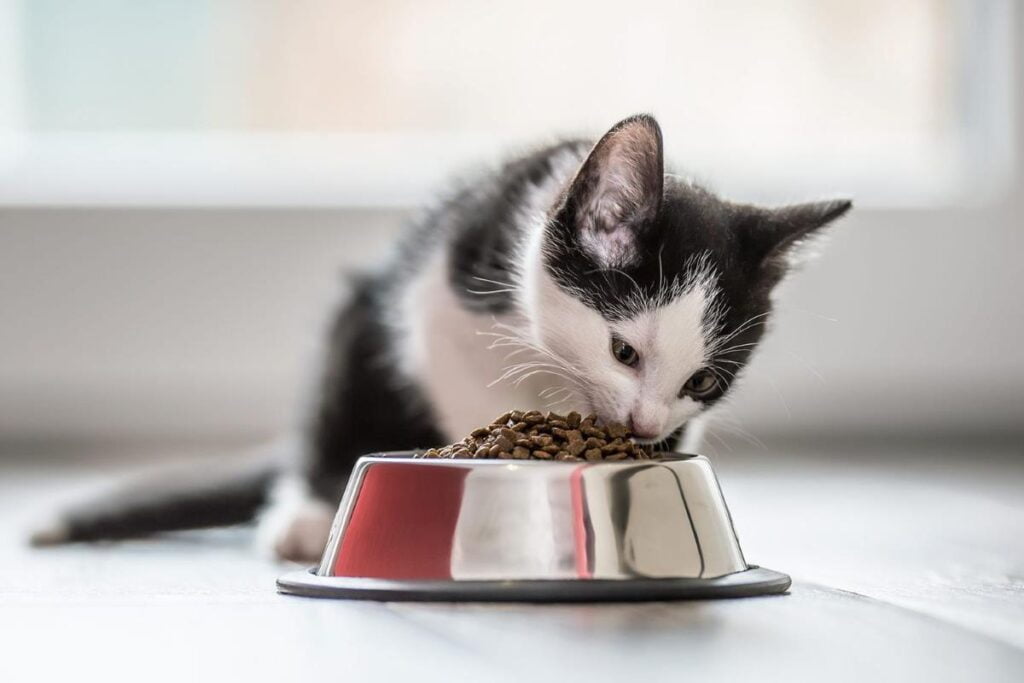
As your adorable 2-month-old kitten grows, their nutritional needs change, and it becomes necessary to introduce them to solid food. While mother cat’s milk provides essential nutrients and antibodies, it is time to gradually transition them to a well-rounded diet. In this article, we will explore the importance of homemade food for 2-month-old kittens, the benefits of mother cat’s milk, transitioning from milk to solids, and provide you with homemade food recipes that are suitable for their age.
We previously talked about 1-month-old Kittens, and how it was not suitable
- Section 1: Nutritional Needs of 2-Month-Old Kittens
- Section 2: Transitioning from Mother's Milk to Solids
- Section 3: The Benefits of Mother Cat's Milk
- Section 4: Benefits of Homemade Food for 2-Month-Old Kittens
- Section 5: Homemade Food Recipes for 2-Month-Old Kittens
- Section 6: Additional Considerations
- Section 7: Frequently Asked Questions (FAQs)
- Conclusion:
Section 1: Nutritional Needs of 2-Month-Old Kittens
At 2 months old, your kitten is entering a crucial stage of growth and development. During this time, their nutritional needs change as they require more energy and nutrients to support their growing bodies. Understanding these nutritional needs is essential in providing a balanced and healthy homemade diet for your kitten.
Protein is a fundamental component of a kitten’s diet as it plays a vital role in building and repairing tissues, supporting muscle development, and aiding in the production of essential enzymes and hormones. Good sources of protein for your 2-month-old kitten include lean meats like chicken, turkey, and fish. These meats provide high-quality protein while being easily digestible for young kittens (try to avoid beef).
Fats are another essential nutrient for your kitten’s development. They provide a concentrated source of energy and aid in the absorption of fat-soluble vitamins. Including a moderate amount of healthy fats in your kitten’s diet, such as those found in fish oil or small amounts of unsalted butter, can contribute to their overall health and well-being.
Carbohydrates, although not as crucial for cats as they are for humans, still serve as a source of energy. Small amounts of cooked rice or mashed sweet potatoes can be included in your kitten’s diet to provide easily digestible carbohydrates.
In addition to proteins, fats, and carbohydrates, your kitten requires a variety of vitamins and minerals to support their overall health.
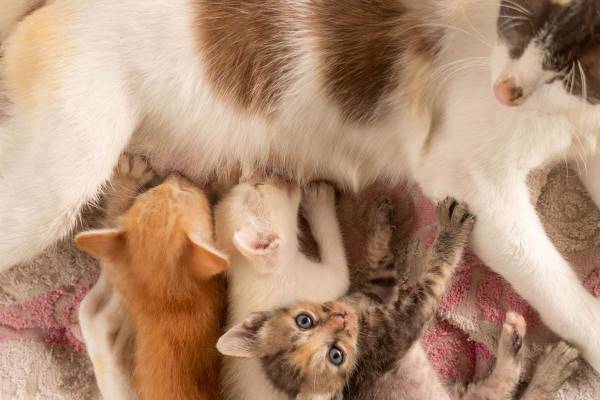
Section 2: Transitioning from Mother’s Milk to Solids
The transition from mother’s milk to solid food is an important milestone in your kitten’s development. Mother cats naturally initiate the weaning process when their kittens are around 4 to 5 weeks old. During this time, the kittens become more curious and start exploring their surroundings, including their mother’s food.
When you notice your kitten showing interest in their mother’s food, it is an indication that they may be ready to start the weaning process. You can begin by offering small amounts of wet kitten food or a homemade puree alongside their mother’s milk. This gradual introduction allows them to familiarize themselves with the taste and texture of solid food while still receiving the essential nutrients from their mother’s milk.
It’s important to remember that mother’s milk continues to be an important part of their diet during the weaning process. As you introduce more solid food, you can gradually reduce the frequency of nursing sessions while ensuring your kitten is still receiving proper nutrition.
Section 3: The Benefits of Mother Cat’s Milk
Mother’s milk is a remarkable source of nutrition for kittens, providing them with essential antibodies and nutrients that contribute to their growth and development. Here are some key benefits of mother cat’s milk:
- Immune System Support: Mother’s milk contains antibodies that help protect kittens from common infections and diseases. These antibodies are especially important during the early weeks of life when a kitten’s immune system is still developing.
- Growth and Development: Mother’s milk is rich in essential nutrients, growth factors, and hormones that support the healthy development of kittens. These nutrients play a crucial role in the growth of bones, muscles, and organs, ensuring kittens reach their full potential.
- Digestive Health: Mother’s milk is easily digestible for kittens, as it contains specific enzymes that aid in the digestion of milk proteins. It helps maintain a healthy gut by promoting the growth of beneficial bacteria and preventing gastrointestinal issues.
- Bonding and Comfort: Nursing provides not only nourishment but also a sense of comfort and security for kittens. The act of nursing establishes a strong bond between the mother cat and her kittens, contributing to their overall well-being and emotional development.
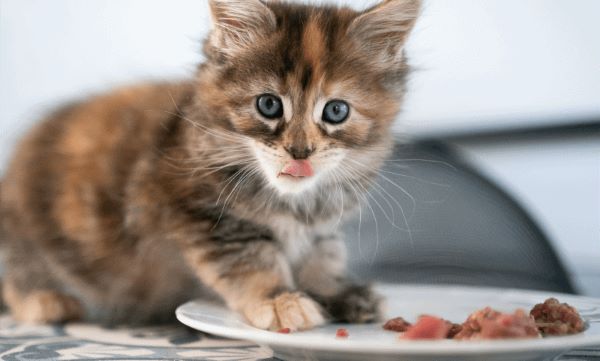
Section 4: Benefits of Homemade Food for 2-Month-Old Kittens
Homemade food can be tailored to meet the specific nutritional needs of your 2-month-old kitten. By selecting high-quality ingredients and preparing meals with care, you can provide a diet that is fresh, wholesome, and free from additives or preservatives.
This level of control is particularly beneficial for young kittens who require precise nutrition for optimal growth and development.
In addition, homemade food allows for the incorporation of fresh fruits and vegetables, such as cooked pumpkin or mashed sweet potatoes. These ingredients provide important vitamins, minerals, and fiber that contribute to overall health and digestion.
Another benefit of homemade food is the opportunity to introduce variety into your kitten’s diet. By rotating protein sources, such as chicken, turkey, or fish, you can offer a range of essential nutrients while preventing the development of dietary sensitivities or allergies. Variation also keeps mealtime exciting for your kitten and helps avoid potential fussiness or boredom with their food.
Sometimes your cat may suffer from particular medical conditions, which may require a specially vetted diet (e.g. allergies, liver disease, kidney disease, etc.) This is another instance where homemade food is often a better option than commercial (and more cheaper too!)
Section 5: Homemade Food Recipes for 2-Month-Old Kittens
Here are some homemade food recipes suitable for 2-month-old kittens, which are easily digested and simple to prepare:
Chicken and Rice Puree:
This recipe provides a gentle and easily digestible option for your 2-month-old kitten. Chicken offers high-quality protein, while rice provides a source of carbohydrates.
Ingredients:
- 1 boneless, skinless chicken breast
- 1/4 cup cooked white rice
- 1/2 cup low-sodium chicken broth
Instructions:
- Boil the chicken breast until cooked thoroughly. Remove any bones and shred the chicken.
- Cook the white rice separately according to package instructions.
- In a blender or food processor, combine the shredded chicken, cooked rice, and chicken broth. Blend until you achieve a smooth puree.
- Serve small portions of the chicken and rice puree to your kitten. Store any leftovers in an airtight container in the refrigerator for up to three days.
Fish and Sweet Potato Mash:
This recipe combines fish, a source of lean protein and omega-3 fatty acids, with sweet potato, which provides carbohydrates and essential nutrients.
Ingredients:
- 1/4 cup cooked fish (such as salmon or white fish)
- 1/4 cup cooked sweet potato
- 1/4 cup low-sodium fish or vegetable broth
Instructions:
- Cook the fish by steaming, baking, or poaching it. Remove any bones and break it into small pieces.
- Cook the sweet potato separately until tender. Mash it with a fork.
- In a bowl, combine the cooked fish, mashed sweet potato, and fish or vegetable broth. Mix well to create a soft mash.
- Offer small portions of the fish and sweet potato mash to your kitten. Store any leftovers in an airtight container in the refrigerator for up to three days.
Turkey and Pumpkin Stew:
This recipe incorporates lean ground turkey, a source of protein, and pumpkin, which aids in digestion and provides essential nutrients.
Ingredients:
- 1/4 cup cooked ground turkey
- 1/4 cup cooked pumpkin (pureed)
- 1/4 cup low-sodium chicken or vegetable broth
Instructions:
- Cook the ground turkey in a skillet until fully cooked. Drain any excess fat and let it cool.
- Cook the pumpkin until soft. Puree it using a blender or food processor.
- In a small pot, combine the cooked ground turkey, pumpkin puree, and chicken or vegetable broth. Heat the mixture gently, stirring occasionally, until warmed through.
- Allow the turkey and pumpkin stew to cool before serving small portions to your kitten. Store any leftovers in an airtight container in the refrigerator for up to three days.
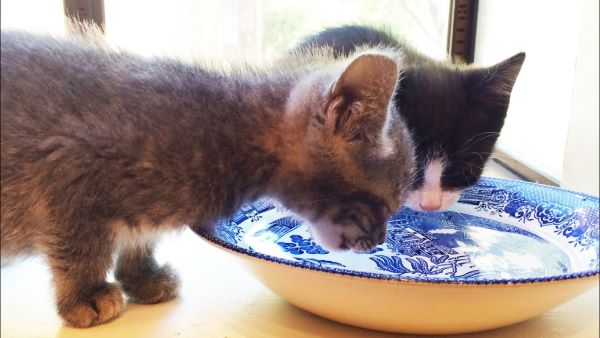
Section 6: Additional Considerations
When feeding your 2-month-old kitten, there are a few additional considerations to keep in mind to ensure their health and well-being. Here are some important points to consider:
- Hydration: Alongside solid food, make sure to provide your kitten with fresh water at all times. Proper hydration is essential for their overall health and helps support optimal digestion. Monitor their water intake to ensure they are drinking an adequate amount.
- Meal Frequency: Kittens have small stomachs and may not be able to consume large amounts of food in one sitting. It is recommended to offer small, frequent meals throughout the day. This approach helps prevent overwhelming their digestive system and allows for better nutrient absorption.
- Foods to Avoid: It’s crucial to be aware of foods that are harmful or toxic to kittens. Avoid feeding them foods such as chocolate, onions, garlic, grapes, and raisins, as these can be toxic and pose a risk to their health. Additionally, certain human foods, such as dairy products, can be difficult for kittens to digest and may cause digestive upset.
- Monitor Digestion: Pay close attention to your kitten’s digestion and overall well-being. Observe their stool consistency, appetite, and energy levels. If you notice any changes or concerns, it may be necessary to adjust their diet or seek veterinary advice.
Section 7: Frequently Asked Questions (FAQs)
Q1: When should I start introducing solid food to my 2-month-old kitten?
A1: Kittens are typically ready to start the transition to solid food between 4 and 6 weeks of age. Signs of readiness include showing interest in their mother’s food and attempting to chew or lick solid objects.
Q2: What should I do if my kitten refuses to eat solids?
A2: If your kitten is hesitant to eat solids, continue offering small amounts alongside their mother’s milk. Gradually increase the portion size and try different textures and flavors to entice them. If concerns persist, consult with a veterinarian for guidance.
Q3: Are there any foods I should avoid giving to my 2-month-old kitten?
A3: Yes, there are several foods that can be harmful to kittens, including chocolate, onions, garlic, grapes, and foods containing artificial sweeteners. It’s best to stick to safe and suitable ingredients for their age.
Conclusion:
Providing homemade food for your 2-month-old kitten is a wonderful way to ensure they receive a nutritious diet. While the transition from mother’s milk to solids is an important milestone, remember to introduce solid food gradually and monitor your kitten’s response.
By understanding their nutritional needs, offering homemade food recipes, and considering commercial options when necessary, you can provide your growing kitten with a nourishing and balanced diet that promotes their overall health and well-being.
